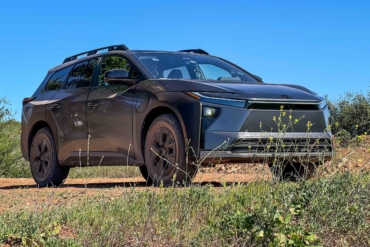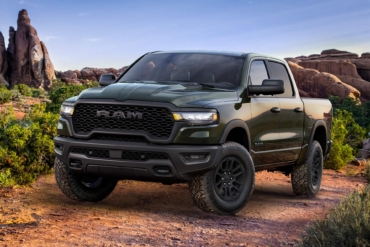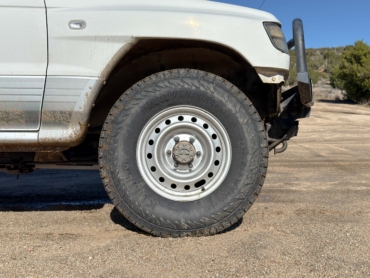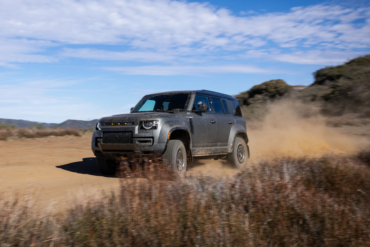Which type of tires are right for you and your vehicle? Tires are paramount to the performance and safety of your vehicle, and we’ve got the answers to your pressing tire questions.
Admittedly, I’m a bit of a tire nerd. I love to geek out on all aspects of the ubiquitous rubber donuts. However, for many vehicle owners, tires are just round, black, and confusing circles that are a necessary evil when it comes to vehicle maintenance.
Frankly, it’s easy to see why tires can be confusing. Just look at the title of this article. You have endless options, and that’s after you’ve decided which size you need.
There are all-season tires, all-weather tires, all-terrain tires, snow tires, summer tires, and all sorts in between. But let’s step back for a moment and look at some of the most popular versions and what makes them unique. It might shed some clarity on future tire-buying decisions.
Multiple Tire Types
When it comes to tires, ideally we’d all own multiple sets and switch them for optimal driving conditions. For starters, you’d have summer tires for warm, dry drives and winter tires for cold and snowy ones, and perhaps a set of studded tires for ice, and non-studded for snow.
Oh, and if you have a 4WD, you would probably want a set of dirt tires, and even a set of mud tires for that muck, too. But most people don’t want to have several sets of tires; some owners don’t even want to switch between summer or winter tires, which is a best practice for cold climates.
Instead, the vast majority of car owners have one tire to fit most conditions. Because of this, tire manufacturers have a variety of tire types for multiple driving scenarios.
Sometimes the jargon can get confusing, though. For example, what’s the difference between an all-season, all-weather, all-terrain and, for that matter, a snow tire? I’m glad you asked.
All-Season Tires: Jacks of All Trades, Masters of None
All-season tires are designed for most conditions most of the time, but don’t excel in any. These tires are the absolute middle ground for tires in terms of performance. That’s not to say they’re a bad choice, but they’re designed to do a bit of everything versus be exceptional at something specific.
That being said, all-season tires typically have a rubber compound that’s designed for having a comfortable ride and getting the most miles while doing so, such as the BFGoodrich Advantage Control tires I installed on my Toyota Yaris.
But there are a variety of all-season tires, such as high-performance versions geared toward sports cars, and touring tires often found on CUVs or minivans. But as a whole, all-season tires are the most middle-of-the-road tires you can get — they’re also usually shod on most new vehicles. Versatile, long-lasting, comfortable, and quiet — these are the traits all-season tires are known for.
Honestly, their biggest downfall is the fact they aren’t masterful at much of anything. No matter the season, they’re never going to provide the best traction or the best grip. For that, you’d need to opt for a dedicated summer tire, a dedicated winter tire, or a dedicated dirt tire.
If there’s one driving condition in which all-season tires suffer most, however, it’s winter and snow performance. This is due to their harder rubber compounds that don’t grip the pavement at colder temperatures (typically 45 degrees F and under), and tire block designs that aren’t conducive to handling snow and slush.
M+S and 3PMSF
Many all-season tires carry the M+S (mud and snow) rating, a designation from the U.S. Rubber Manufacturers Association. This means they have deeper grooves for muddy and snowy conditions.
There isn’t an actual performance standard these tires must meet to be considered M+S. Instead, it’s based on the tire’s tread design.
So, while an all-season tire might have the M+S rating, they’re actually neither mud nor snow tires. But, in exchange for versatile yet nonmasterful performance, buyers get a longer service life.
If you’re regularly driving in muddy or snowy conditions, you might want to step up to another newer tire style: the all-weather tire.
All-Weather: The Four-Season Tire

All-weather tires are a European transplant that has been getting traction on the U.S. market in the last several years. These tires came about because many European drivers were required to have two sets of tires: one for summer, and one for winter (depending on locale), and they would rotate between the two.
At some point, someone developed a tire for use during all four seasons. This eliminated the need to have two sets of rubber.
All-weather tires carry the three-peak mountain snowflake (3PMSF) logo, designating severe snow service requirements. For many years, only snow tires earned this designation. But now some all-season tires carry it, and often carry the title of all-weather tires.
All-weather tires perform better in the snow than all-season tires carrying just the M+S rating. This is due to compounds that can perform more admirably in cooler temperatures. They also have more siping and unique tread patterns to usher away snow and slush.
According to tire retailer Tire Rack, “In 1999, The U.S. Tire Manufacturers Association (USTMA) and the Rubber Association of Canada (RAC) agreed on a performance-based standard to identify passenger and light truck tires that attain a traction index equal to, or greater than 110 (compared to a reference tire which is rated 100) during the specified American Society for Testing and Materials traction tests on packed snow. The standard helps ensure drivers can easily identify tires that provide a higher level of snow traction, and tires meeting that standard are branded with the three-peak mountain snowflake (3PMSF) symbol.”
For years, I’ve jokingly said all-weather tires are basically all-season tires for people living in Finland. They’re more versatile in temps both above and below 45 degrees F than all-season tires, yet still have high mileage warranties. They are, however, often not as quiet as an all-season tire due to a blockier tread design.
I recently equipped my 1998 Honda CR-V with a set of Toyo Celsius all-weather tires and embarked on a 4,500-mile winter road trip from Oregon to Wisconsin and back over the holidays. The tires’ performance in rainy, snowy, and slushy conditions impressed me. We even saw temps near -10 degrees F, and the tires performed well. Add to it, they have a 60,000-mile tread life warranty.

All-weather tires can be a great alternative to standard all-season tires for people who don’t want to switch out to a dedicated winter tire. And they’re a good choice for people living in colder climates.
It should be noted, however, that despite the 3PMSF ratings, they’re still not as competent in snow, slush, and ice as a dedicated winter tire.
Winter Tires: One-Season Wonders

If all-season tires are just OK in the snow, and all-weather tires are better, dedicated winter tires are the best you can get for cold, snowy, and icy conditions. But you’ll only want to use them in the winter.
When used above 45 degrees F and run on bare pavement, snow tires will wear quickly. However, their snow, slush, and ice performance is above and beyond other tires. Similarly, a dedicated summer tire would be better for warm, dry conditions.
Winter tires are often noisier than all-season/all-weather tires due to their aggressive blocky tread design for snow. But they are great for harsh winter conditions where you might encounter deep snow and fair bits of ice.
Their chunky tread patterns with aggressive siping and softer rubber compounds are excellent at channeling out the wintertime muck and providing maximum traction in cold temps.
But that performance is at the expense of dry-pavement grip, wear, and noise — especially if you have a set of studded winter tires. Studded tires are not legal in all states, as they chew up the road’s pavement. Some states allow them (such as my state of Oregon), and their performance specifically on ice can be advantageous.
Studs or not, snow tires are also noisier than all-season or all-weather tires. And because you’re not going to want to run these in the warmer months, you’ll likely want to mount winter tires on a separate set of wheels to avoid having tires mounted and dismounted off your only set of wheels. This means you’ll have summer and winter tires, which means you’ll always have to store one set somewhere.
Oh, by the way, if your car uses a tire pressure monitoring system (TPMS), prepare for the extra expense of installing a second set of sensors in your winter rolling stock.
Make no mistake: Winter tires are amazing in cold, snowy, and icy conditions. But these specialized tires come with distinct compromises.
All-Terrain: Dirt-Ready, and Sometimes More

We wouldn’t be covering all the “all” tires without briefly mentioning all-terrains. You can find these tires on trucks, SUVs, and sometimes crossovers, but rarely on cars. Their design focuses on performance in a mix of dirt and pavement.
However, some all-terrain tires also have the 3PMSF rating, making them truly good in nearly all terrains. The one exception is mud. And there are dedicated mud-terrain tires, but they generally don’t carry the 3PMSF rating and make a lot of noise on pavement.
All-terrains often utilize blocky tread compounds. These help them run circles around all-season highway tires when you leave the pavement.
But they usually come in sizes compatible with trucks and SUVs; some crossover-style sizes are becoming available. They do, however, come in LT (light truck) versions that have heavier-duty sidewalls for the demands of heavier-duty vehicles.
An all-terrain tire is really what you want if you’ve got a 4WD vehicle that’s trading pavement performance for dirt driving. So if you’ve got something like a Jeep or a pickup truck, these can be a fantastic choice. However, this tire’s on-road handling and quietness aren’t as good as an all-season or all-weather tire.
Ultimately, the Tire Choice Is Up to You

But tires are, effectively, a safety device and you should educate yourself on which tire type is right for you, your driving conditions, and your vehicle.
But, let’s put it this way: If you don’t live somewhere that gets under 45 degrees F, an all-season tire can still be a good choice due to its versatility. If you’re looking for the upper echelon of cornering, go with a summer tire.
If you live somewhere cold and snowy, the best option is having a dedicated set of summer and winter tires. But if you don’t want to swap out tires in the cold, take a look at the burgeoning all-weather segment with better snow performance.
And if you have a truck, SUV, or a CUV, an all-terrain tire is a fantastic choice if you venture off the pavement from time to time. And check out all-terrains with the 3PMSF rating if you venture into cold, snowy situations.
There really is a tire for every vehicle out there. Arming yourself with a bit of knowledge will ensure that you get the right rubber for your ride.







